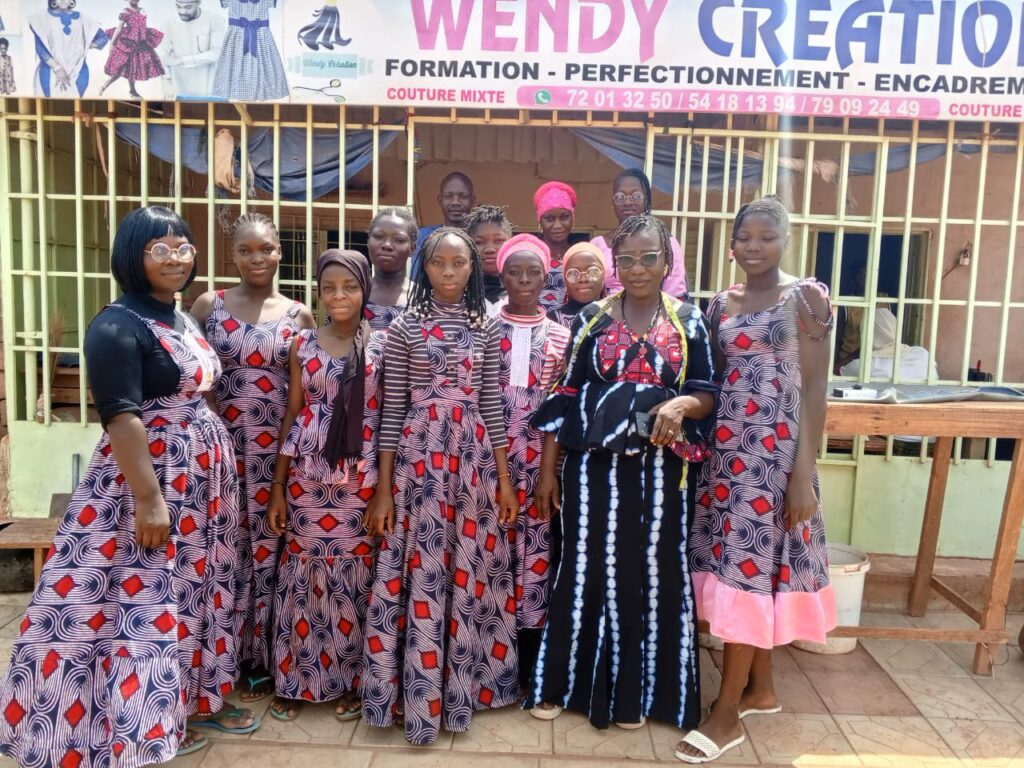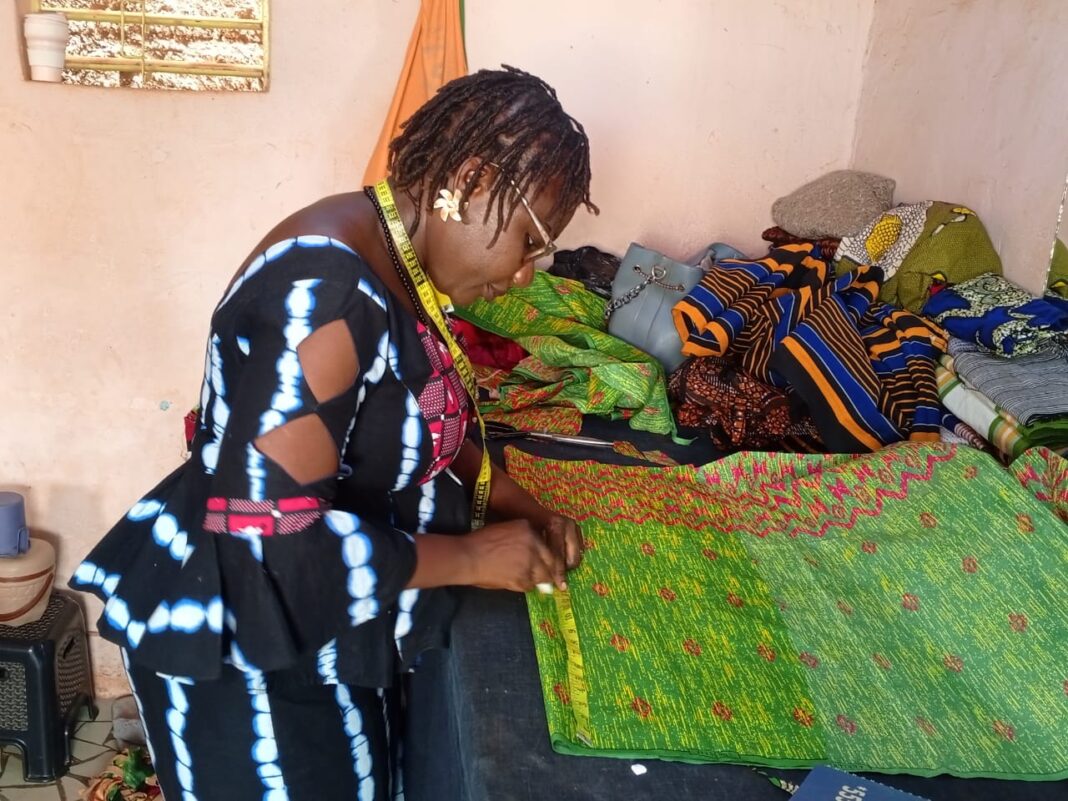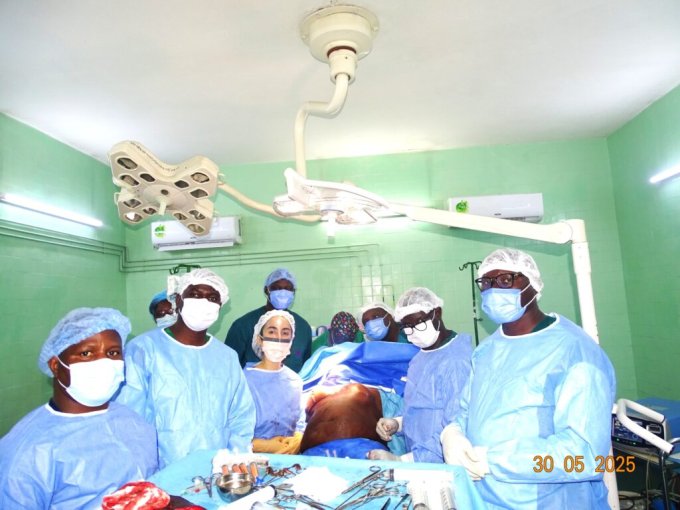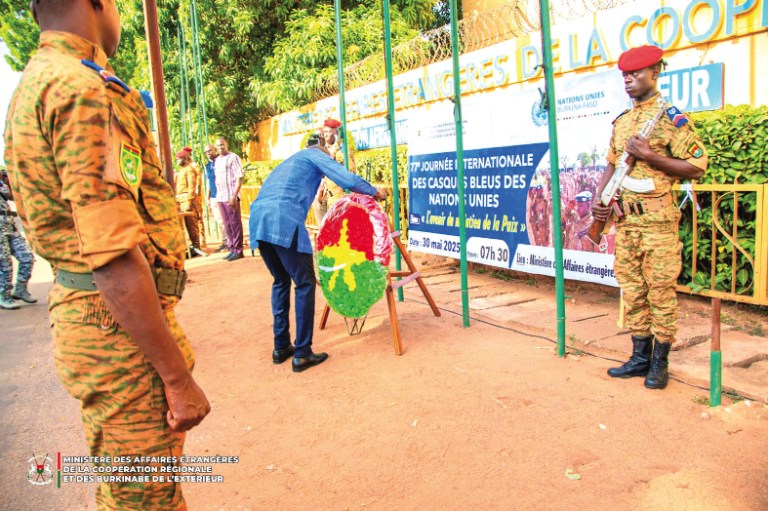Dans les ruelles animées de Ouagadougou comme dans les villages reculés, des femmes burkinabè façonnent l’avenir avec leurs mains. Entre tradition et innovation, elles transforment l’artisanat en un véritable levier d’émancipation. Au Burkina Faso, l’artisanat est plus qu’un métier . c’est un patrimoine. Pour de nombreuses femmes, il représente aussi une échappatoire à la précarité et un moyen de revendiquer leur place dans la société. Anna Traoré ,une couturière renommée, responsable de l’atelier Wendy création , nous raconte son parcours.
Passionnée par la couture depuis l’enfance, Madame Anna Traoré a su transformer une passion en un métier durable. Aujourd’hui, elle forme des dizaines de jeunes filles et milite pour une reconnaissance du savoir-faire artisanal féminin au Burkina Faso.
Dans son atelier de couture situé au cœur de la capitale burkinabé, les tissus colorés s’entassent et les machines vrombissent sans relâche.
Madame Traoré Anna, la cinquantaine rayonnante, garde les mains occupées et l’esprit clair. « Tout a commencé dès le bas âge, quand on jouait entre amies ,j’étais toujours la couturière du groupe», confie t-elle.
Cette passion d’enfance, elle en a fait un métier. Après avoir mis de côté d’autres pistes, elle se lance officiellement dans la couture en 1993. Neuf ans plus tard, en 2002, elle ouvre son propre atelier. Depuis, elle ne s’est jamais arrêtée.
Mais au-delà de ses propres créations, c’est la transmission qui l’anime. « J’offre des formations en couture homme, femme et même en broderie à Ouagadougou comme en dehors. J’en ai formé une quarantaine et beaucoup sont aujourd’hui autonomes.» Grâce à un partenariat avec l’Action sociale en collaboration avec l’association ASMADE, elle accueille des jeunes filles en difficulté.
Les défis, pourtant, ne manquent pas. « Certaines n’ont même pas à manger. Je suis souvent obligée de partager ce que j’ai avec elles. » L’entretien du matériel est un autre combat quotidien qu’elle rencontre . « Les nouvelles détruisent souvent les machines vu qu’elles ne maîtrisent pas. Je n’arrive même pas à faire cinq ou six ans avec une seule. », dit-elle. Avec les clientes ce n’est pas toujours simple non plus. « Elles choisissent un modèle, puis une fois la couture faite, elles veulent changer, comme si ce n’était pas elles-mêmes qui avaient choisi ! » déclare t-elle en riant.

Madame Traoré ne se considère pas comme riche, mais elle est fière de ce qu’elle a accompli. « Je fais beaucoup de choses par moi-même. Aujourd’hui, on ne peut plus compter sur quelqu’un. ». A l’entendre, certains pensent que la couture, c’est pour les ratés. Pourtant, c’est tout le contraire. La couture, c’est de la précision, du calcul, de l’intelligence.Avec ses mains habiles et son cœur ouvert, Madame Traoré tisse bien plus que des vêtements . Elle façonne des vies, redonne confiance à des jeunes filles, et rappelle que l’artisanat féminin a toute sa place dans le développement du Burkina Faso..
C’est le cas de Madame koffi Ouédraogo Raïcha, une élève de madame Traoré, actuellement propriétaire d’un atelier de couture. « J’ai eu a faire deux ans de formation chez les sœurs mais C’était de la théorie, mais avec madame traoré , elle était plus sur la pratique, et cela m’a beaucoup aidé», raconte t-elle. Voisine de Traoré , cette proximité a facilité le contact et l’intégration dans l’atelier. « Ma vie a changé. Il y a 6 ans, je n’avais pas d’atelier et j’apprenais toujours, et aujourd’hui grâce à Dieu j’ai mon atelier , et j’ai eu à former d’autres filles également. J’arrive à subvenir à mes besoins et celles de ma famille », a- t-elle laissé entendre avec un sourire au visage. Reconnaissante, elle a remercié Traoré pour tout l’effort qu’elle fournit, le savoir transmis aux jeunes filles. « Toutes les filles qui sont passées par son atelier de couture et toutes celles qui n’ont pas baissé les bras sont bien placées actuellement », conclut- elle avec fierté.
Quant à Monsieur Sawadogo Issac , chef de service de l’éducation, la santé et de l’action sociale à la mairie de l’arrondissement 8 de la commune de Ouagadougou, il a salué l’initiative de Madame Traoré. Selon ses propos, elle a approché la mairie pour présenter ses services et demander un partenariat en faveur de jeunes filles vulnérables. «Nous sommes allés découvrir son travail et nous avons constaté qu’elle faisait un bon travail» . Le partenariat mis en place consistait donc à placer des jeunes filles déscolarisées , non scolarisées âgées de 9 ans à 19 ans pour la formation en couture. L’idée était d’offrir une formation pratique dans le but de favoriser leur autonomisation.
De son avis, Madame traoré a dépassé les attentes initiales en accompagnant ces jeunes filles au-delà de la durée prévue. En effet, en plus de la formation, ces filles ont bénéficiés d’un stage et actuellement beaucoup ont leur atelier et emplois aussi d’autres personnes. «Le placement de ces filles est une priorité de l’Etat aussi. Nous travaillons en partenariat avec l’association ASMADE et même la banque mondiale mais nous recherchons d’autres partenaires», a-t-il poursuivi.
Le coût de la formation est estimé à 25 mille francs par mois et par bénéficiaire.10 filles ont été prises en charge avec ce projet qui couvrait l’installation des jeunes filles en matériels et en atelier. Monsieur Sawadogo a tenue a encourager la promotrice Anna en soulignant que « il n y a rien de plus admirable qu’une femme qui travaille, qui soutien son mari et parvient à être autonome».
Il faut noter qu’au Burkina Faso, le secteur informel reste un pilier de l’économie nationale, représentant une part importante de l’activité quotidienne. Dans ce paysage souvent méconnu, des figures inspirantes se démarquent par leur engagement et leur sens du partage. C’est le cas de madame Traoré , dont l’atelier ne se limite pas à la confection de vêtements. En offrant gracieusement des formations à des jeunes, souvent sans emploi ou en situation de vulnérabilité, elle joue un rôle de formatrice, de mentor, et même de soutien moral.
Bien qu’il échappe parfois aux cadres réglementaires, son atelier abrite des talents et des savoir-faire qui méritent reconnaissance et accompagnement. Encourager et structurer de telles initiatives pourraient permettre à terme de transformer ce secteur en un véritable levier de développement durable pour le Burkina Faso.



